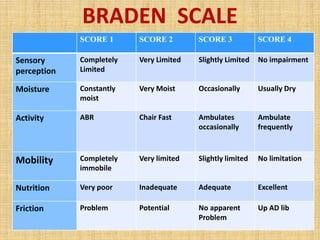A nurse is to infuse two 1L bags of normal saline to a patient at 80ml/hr. How many hours will it take to infuse the total amount of normal saline?
(Round to the whole number. Assume no interruptions in the infusion.)
The Correct Answer is ["25"]
To calculate the number of hours required to infuse two 1L bags of normal saline at a rate of 80 ml/hr, you can use the following formula:
Time (hours) = Total volume (ml) / Infusion rate (ml/hr)
First, calculate the total volume of normal saline to be infused:
Total volume = 2 bags x 1L/bag x 1000 ml/L = 2000 ml
Now, plug this into the formula:
Time (hours) = 2000 ml / 80 ml/hr
Time (hours) = 25 hours
So, it will take 25 hours to infuse the total amount of normal saline at a rate of 80 ml/hr, assuming no interruptions in the infusion. Rounded to the nearest whole number, it will take 25 hours.
Nursing Test Bank
Naxlex Comprehensive Predictor Exams
Related Questions
Correct Answer is B
Explanation
A. Morse Scale:
The Morse Scale, also known as the Morse Fall Scale, is used to assess a patient's risk of falling. It evaluates various factors such as history of falling, secondary diagnosis, ambulatory aids, IV therapy, gait, and mental status. It is primarily focused on assessing the risk of falls, not pressure ulcers.
B. Braden Scale:
As previously mentioned, the Braden Scale assesses a patient's risk for developing pressure ulcers. It takes into account sensory perception, moisture, activity, mobility, nutrition, and friction/shear. The scale helps healthcare providers determine the level of risk a patient has for developing pressure sores and guides interventions to prevent them.
C. Bristol Scale:
The Bristol Stool Scale is used to classify the form of human feces into seven categories. It is a medical aid designed to classify the form of human feces into seven categories. This scale is primarily used to assess bowel movements and is unrelated to pressure ulcers.
D. Hendrich II Scale:
The Hendrich II Fall Risk Model is a tool designed to identify patients at risk for falls. It includes factors such as confusion, symptomatic depression, altered elimination, dizziness, male gender, and the use of antiepileptics, benzodiazepines, or non-opioid analgesics. Similar to the Morse Scale, it focuses on assessing the risk of falls, not pressure ulcers.

Correct Answer is ["A","B","C","E"]
Explanation
A. Applying ice intermittently - Ice application helps reduce swelling and inflammation by constricting blood vessels. It is effective in managing pain and preventing further tissue damage in contusions, strains, and sprains.
B. Elevating the injured limb - Elevating the injured limb above the level of the heart helps reduce swelling by allowing fluids to drain away from the injured area. This is particularly important in managing contusions, strains, and sprains where swelling is a common symptom. Elevation supports the body's natural healing processes.
C. Resting the affected extremity - Rest is essential to allow the injured tissue to heal. Avoiding movement and stress on the affected area prevents further damage and promotes the healing process. Resting the extremity prevents additional strain on the injured muscles, ligaments, or tendons, allowing the body to repair the damaged tissues effectively.
D. Massaging the affected limb - Massaging the affected limb is generally not recommended in the acute phase of musculoskeletal injuries, especially contusions, strains, or sprains. Massaging can potentially worsen the injury, increase swelling, and cause further tissue damage. It is important to wait until the initial acute phase has passed and consult a healthcare professional before considering massage therapy.
E. Compression dressings - Compression helps control swelling by applying pressure to the injured area. Compression dressings or bandages provide support to the injured limb, minimize swelling, and reduce the risk of further injury. However, it's essential to apply compression correctly to avoid cutting off circulation, and it's usually best done under the guidance of a healthcare provider.
Whether you are a student looking to ace your exams or a practicing nurse seeking to enhance your expertise , our nursing education contents will empower you with the confidence and competence to make a difference in the lives of patients and become a respected leader in the healthcare field.
Visit Naxlex, invest in your future and unlock endless possibilities with our unparalleled nursing education contents today
Report Wrong Answer on the Current Question
Do you disagree with the answer? If yes, what is your expected answer? Explain.
Kindly be descriptive with the issue you are facing.
